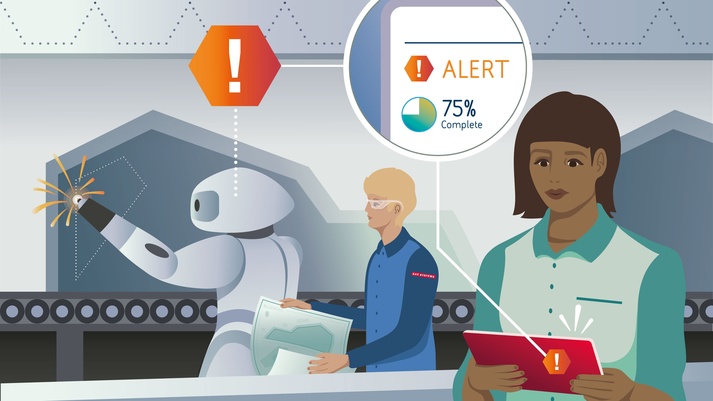Photo-realistic VR tour Oof the Palace Of Versailles now available free on SteamVR — from vrscout.com by Kyle Melnick
‘Goliath is winning’: The biggest U.S. banks are set to automate away 200,000 jobs — from gizmodo.com by Brian Merchant
Excerpt (excerpt):
Over the next decade, U.S. banks, which are investing $150 billion in technology annually, will use automation to eliminate 200,000 jobs, thus facilitating “the greatest transfer from labor to capital” in the industry’s history. The call is coming from inside the house this time, too—both the projection and the quote come from a recent Wells Fargo report, whose lead author, Mike Mayo, told the Financial Times that he expects the industry to shed 10 percent of all of its jobs.
This, Mayo said, will lay the groundwork for, and I quote, “a golden age of banking efficiency.” The job cuts are slated to hit front offices, call centers, and branches the hardest, where 20-30 percent of those roles will be on the chopping block. They will be replaced by better ATMs, automated chatbots, and software instruments that take advantage of big data and cloud computing to make investment decisions.
“The next decade should be the biggest decade for banks in technology in history,” Mayo said.
From DSC:
How does this impact entry level positions? How does this help a young graduate who is trying to get out of the Catch 22 with job experience? How are colleges and universities helping young people navigate these quickly changing landscapes?
The 7 biggest technology trends in 2020 everyone must get ready for now — from forbes.com by Bernard Marr
Excerpts:
- AI-as-a-service
- 5G data networks
- Autonomous Driving
- Personalized and predictive medicine
- Computer Vision
- Extended Reality
- Blockchain Technology
From DSC:
I appreciate this list from Bernard. I would also add voice-enabled interfaces/products (NLP) to this list, as well as more integration of AI into learning-related applications and services.
For the federal agencies, state representatives, senators, law schools, students in law school, lawyers, legislators, CIO’s, and CEO’s etc. out there: Are you/we ready for these? Given the pace of exponential change, how are you seeking to keep a pulse-check on these types of emerging technologies and their impacts on our society? How are you/we guiding the development of these emerging technologies?
The blinding of justice: Technology, journalism and the law — from thehill.com by Kristian Hammond and Daniel Rodriguez
Excerpts:
The legal profession is in the early stages of a fundamental transformation driven by an entirely new breed of intelligent technologies and it is a perilous place for the profession to be.
If the needs of the law guide the ways in which the new technologies are put into use they can greatly advance the cause of justice. If not, the result may well be profits for those who design and sell the technologies but a legal system that is significantly less just.
…
We are entering an era of technology that goes well beyond the web. The law is seeing the emergence of systems based on analytics and cognitive computing in areas that until now have been largely immune to the impact of technology. These systems can predict, advise, argue and write and they are entering the world of legal reasoning and decision making.
Unfortunately, while systems built on the foundation of historical data and predictive analytics are powerful, they are also prone to bias and can provide advice that is based on incomplete or imbalanced data.
…
We are not arguing against the development of such technologies. The key question is who will guide them. The transformation of the field is in its early stages. There is still opportunity to ensure that the best intentions of the law are built into these powerful new systems so that they augment and aid rather than simply replace.
From DSC:
This is where we need more collaborations between those who know the law and those who know how to program, as well as other types of technologists.
The rise of the lawyer — from law21.ca by Jordan Furlong
Per Jordan:
Earlier this year, I received an invitation to write the epilogue for a book called New Suits: Appetite for Disruption in the Legal World, by Michele DeStefano (founder of the groundbreaking Law Without Walls program based at the University of Miami Law School) and Guenther Dobrauz-Saldapenna (partner and leader of PwC Legal Switzerland and leader of PwC’s global legal tech efforts). New Suits is an enormously ambitious and illuminating exploration of the frontiers of technology-powered legal practice, especially for large enterprise clients and their outside counsel, and I highly recommend that you read it.
Of course, I’m no technology expert, and I felt supremely unqualified to say anything useful about the impact of blockchain, AI, RegTech, and so on. But I thought that lawyers who read New Suits, especially newly called lawyers or law students, might reach the end of the book feeling a little overwhelmed by the scale of change facing them, and wondering whether the legal world of the future would in any way resemble the one they had already entered — and if that world would need, want, or even welcome lawyers.
So I wrote what was essentially a message to those lawyers, to explain what all the forthcoming changes would mean for them, what the new legal world was going to demand of them, and what they should feel both empowered and required to demand in return. With the kind permission of the authors, and with a few small edits, here is that lengthy but heartfelt message.
So here’s what I’d very much like you to remember: What you do matters. Who you are matters. When you speak out, it has an impact. When you fall silent, that has an impact too. Do not let yourself get lost in the noise and complexity of the machine; do not lose sight of the primacy and power of true service; do not lose who you are, and who you could be, amid the upheaval and disruption to come. Out of this chaos, you can forge new meaning and greater purpose. Out of the end of one era in the legal profession’s history, you can launch the start of another.
Also see:
How augmented reality will overhaul our most crucial industries — from singularityhub.com by Peter Diamandis
Excerpts:
Healthcare
(1) Surgeons and physicians
(2) Assistance for those with disabilities
(3) Biometric displays
Retail & Advertising
(1) Virtual shopping
(2) Advertising
Education & Travel
(1) Customized, continuous learning
Within the classroom, Magic Leap One’s Lumin operating system allows multiple wearers to share in a digital experience, such as a dissection or historical map. And from a collaborative creation standpoint, students can use Magic Leap’s CAD application to join forces on 3D designs.
In success, AR’s convergence with biometric sensors and AI will give rise to an extraordinarily different education system: one comprised of delocalized, individually customizable, responsive, and accelerated learning environments.
(2) Training
(3) Travel
Manufacturing
(1) Design
(2) Supply chain optimization
(3) Quality assurance & accessible expertise
Transportation & Navigation
(1) Autonomous vehicles
(2) Navigation
Entertainment
(1) Gaming
(2) Art
Google’s war on deepfakes: As election looms, it shares ton of AI-faked videos — from zdnet.com by Liam Tung
Google has created 3,000 videos using actors and manipulation software to help improve detection.
Excerpt:
Google has released a huge database of deepfake videos that it’s created using paid actors. It hopes the database will bolster systems designed to detect AI-generated fake videos.
With the 2020 US Presidential elections looming, the race is on to build better systems to detect deepfake videos that could be used to manipulate and divide public opinion.
Earlier this month, Facebook and Microsoft announced a $10m project to create deepfake videos to help build systems for detecting them.
Kids are surrounded by AI. They should know how it works. – via @techreview https://t.co/gX1N0Lj7UP
— dane lancaster ? OC6 (@danelancaster) September 20, 2019
A new curriculum that helps children understand how algorithms are designed will keep them safe and motivate them to help shape the technology’s future.
Top jobs in 2040 will involve virtual reality, artificial intelligence & robotics — from themanufacturer.com by Jonny Williamson
Emerging technologies such as virtual reality (VR), artificial intelligence (AI) and robotics will strongly influence the careers we do in the future, according to new research from BAE Systems.
Excerpt:
- Almost half of young people (47%) aged between 16-24 believe that one day they will work in a role that doesn’t exist yet, but only one-in-five (18%) think they are equipped with the skills required to future-proof their careers.
. - Three-quarters (74%) also feel that they are not getting enough information about careers that will be available in the future.
Walgreens to test drone delivery service with Alphabet’s Wing — from cnbc.com by Jasmine Wu
Key Points:
- Walgreens is working with Alphabet’s drone delivery service Wing to test a new service.
- The pilot program will deliver food and beverage, over-the-counter medications and other items, but not prescriptions.
- Amazon said in June its new delivery drone should be ready “within months” to deliver packages to customers.
Add that to these other robots, drones, driverless pods, etc.:
- Autonomous robot deliveries are coming to 100 university campuses in the U.S. — from digitaltrends.com by Luke Dormehl
- Postmates Gets Go-Ahead to Test Delivery Robot in San Francisco — from interestingengineering.com by Donna Fuscaldo
- Amazon patents ‘surveillance as a service’ tech for its delivery drones — from theverge.com by Jon Porter
- This futuristic driverless pod will soon be delivering pizza in Texas — from digitaltrends.com by Trevor Mogg
- Amazon is creating detailed 3D models of suburbia to train its new delivery robots — from theverge.com by James Vincent
From DSC:
Is a wild, wild west developing? It appears so. What does the average citizen do in these cases if they don’t want such drones constantly flying over their heads, neighborhoods, schools, etc.?
I wonder what the average age is of people working on these projects…?
Just because we can…
From DSC:
For a look at how #AI is being integrated into various industries, check out the article below.
AI 50: America’s Most Promising Artificial Intelligence Companies — from forbes.com by Jillian D’Onfro
Excerpts:
Artificial intelligence is infiltrating every industry, allowing vehicles to navigate without drivers, assisting doctors with medical diagnoses, and mimicking the way humans speak. But for all the authentic and exciting ways it’s transforming the tasks computers can perform, there’s a lot of hype, too.
…
The inherently broad term gets bandied about so often that it can start to feel meaningless and gets trotted out by companies to gussy up even simple data analysis. To help cut through the noise, Forbes and data partner Meritech Capital put together a list of private, U.S.-based companies that are wielding some subset of artificial intelligence in a meaningful way and demonstrating real business potential from doing so.
…
The honorees span categories like human resources, security, insurance, and finance, with healthcare, transportation, and infrastructure startups best represented on the list.
A momentous change in the legal industry garnering little attention — from forbes.com by Hendrik Pretorius
Excerpt:
The needed evolution in legal service delivery may receive a big push in the near future. Surprisingly, this issue seems to be flying under the radar for many in the legal industry.
The California Bar, through its Task Force on Access Through Innovation of Legal Services, created in 2018, seeks to “identify possible regulatory changes to enhance the delivery of, and access to, legal services through the use of technology, including artificial intelligence and online legal service delivery models.”
A report commissioned by this task force stated that “[m]odifying the ethics rules to facilitate greater collaboration across law and other disciplines will (1) drive down costs; (2) improve access; (3) increase predictability and transparency of legal services; (4) aid the growth of new businesses; and (5) elevate the reputation of the legal profession.”
Herein lies one of the fundamental challenges within the legal industry: viewing the law as the delivery of a legal product, and understanding that this delivery needs to revolve around the user, not the lawyer. There is a real and growing divide between the current model of legal service delivery put forth by a traditional law firm model and what the public wants. Consumers have raised the bar based on what they are experiencing in interacting with other businesses in other industries.
…
I love what many of these legal tech companies are doing: They are applying standards from outside the entrenched legal industry and changing entire delivery models. This should be a real wake-up call. But how can law firms truly compete and play a role?
DIY Mindset Reshaping Education — from campustechnology.com by Dian Schaffhauser
Excerpt:
A do-it-yourself mindset is changing the face of education worldwide, according to new survey results. Learners are “patching together” their education from a “menu of options,” including self-teaching, short courses and bootcamps, and they believe that self-service instruction will become even more prevalent for lifelong learning. In the United Sates specifically, 84 percent of people said learning would become even more self-service the older they get.
Among those who have needed to reskill in the last two years to continue doing their jobs, 42 percent found information online and taught themselves and 41 percent took a course or training offered by their employers, a professional association or bootcamp, compared to just 28 percent who pursued a professional certification program, 25 percent who enrolled in a university-level degree program or 12 percent who did nothing.
If people had to learn something new for their career quickly, they said they would be more likely turn to a short training program (47 percent), followed by access to a free resource such as YouTube, Lynda.com or Khan Academy (33 percent). A smaller share (20 percent) would head to an accredited university or college.
From DSC:
This is why the prediction from Thomas Frey carries weight and why I’ve been tracking a new learning platform for the 21st century. Given:
- The exponential pace of technological change occurring in many societies throughout the globe

- That emerging technologies are game-changers in many industries
- That people will need to learn about those emerging technologies and how to leverage/use them <– if they want to remain marketable/employed
- That people need to reinvent themselves quickly, efficiently, and cost-effectively
- That many people can’t afford the time nor the funding necessary these days to acquire a four-year higher ed degree
- That running new courses, programs, etc. through committees, faculty senates, etc. takes a great deal of time…and time is something we no longer have (given this new pace of change)
…there needs to be a new, up-to-date, highly responsive, inexpensive learning-related platform for the 21st century. I call this learning platform of the future, “Learning from the Living [Class] Room.” And while it requires subject matter experts / humans in significant ways, AI and other technologies will be embedded throughout such a platform.
“I’ve been predicting that by 2030 the largest company on the internet is going to be an education-based company that we haven’t heard of yet,” Frey, the senior futurist at the DaVinci Institute think tank, tells Business Insider.
— source
Addendum on 9/18/19:
- Education Startup Launches Online Courses for College Credit — from campustechnology.com by Sara Friedman
For $400 per course, students will be able to gain access to course videos that are cinematically filmed and taught by “some of the brightest minds in academia.” Outlier.org students will also have access to problem sets, one-on-one tutoring and assessments proctored through artificial intelligence.
5 emerging tech trends impacting the enterprise — from campustechnology.com by Rhea Kelly
Excerpts:
Gartner’s Emerging Technologies Hype Cycle focuses specifically on new technologies (not previously highlighted in past Hype Cycles) that “show promise in delivering a high degree of competitive advantage over the next five to 10 years.” The five most impactful trends to watch this year are:
- Sensing and mobility.
- Augmented human.
- Postclassical compute and comms.
- Digital ecosystems.
- Advanced AI and analytics.
Someone is always listening — from Future Today Institute
Excerpt:
Very Near-Futures Scenarios (2020 – 2022):
- Optimistic: Big tech and consumer device industries agree to a single set of standards to inform people when they are being listened to. Devices now emit an audible ping and/ or a visible light anytime they are actively recording sound. While they need to store data in order to improve natural language understanding and other important AI systems, consumers now have access to a portal and can see, listen to, and erase their data at any time. In addition, consumers can choose to opt-out of storing their data to help improve AI systems.
- Pragmatic: Big tech and consumer device industries preserve the status quo, which leads to more cases of machine eavesdropping and erodes public trust. Federal agencies open investigations into eavesdropping practices, which leads to a drop in share prices and a concern that more advanced biometric technologies could face debilitating regulation.
-
Catastrophic: Big tech and consumer device industries collect and store our conversations surreptitiously while developing new ways to monetize that data. They anonymize and sell it to developers wanting to create their own voice apps or to research institutions wanting to do studies using real-world conversation. Some platforms develop lucrative fee structures allowing others access to our voice data: business intelligence firms, market research agencies, polling agencies, political parties and individual law enforcement organizations. Consumers have little to no ability to see and understand how their voice data are being used and by whom. Opting out of collection systems is intentionally opaque. Trust erodes. Civil unrest grows.
Action Meter:

Watchlist:
- Google; Apple; Amazon; Microsoft; Salesforce; BioCatch; CrossMatch; ThreatMetrix; Electronic Frontier Foundation; World Privacy Forum; American Civil Liberties Union; IBM; Baidu; Tencent; Alibaba; Facebook; Electronic Frontier Foundation; European Union; government agencies worldwide.













